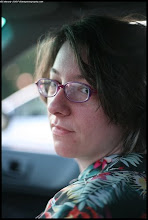After the death of her twin sister, Mori Phelps, having run away from her mad and arguably evil mother in Wales, finds herself sent to live with her estranged father in England. Her father's half-sisters, who support him financially and keep him on a short leash, arrange for Mori to go to their old boarding school, Arlinghurst, where she (of course) belongs not at all; even the fairies, when she does eventually see a few, don't talk to her as the ones in Wales often would. And then she starts to get letters from her mother, containing photos of the twins with Mori carefully burned out of them.
I'm such a big fan of Jo Walton's blogging at Tor.com that I'm a little embarrassed to admit this is the first book of hers that I've read. She says that Among Others began as an attempt to mythologize some real events in her life, and I have to think, given what she has posted about her own reading habits as a young person, that Mori is 15 in 1979 and reading a lot of science fiction because Jo was 15 then and had read all those books. It's a coming of age story about finding what I call my tribe and Mori, after Vonnegut, calls her karass; it's a book about what happens when you prepare yourself to die saving the world, and survive; and most of all it's about how if you love books enough, books will love you back.
Wednesday, August 3, 2011
Tuesday, August 2, 2011
Ghost Story
Who shot Harry Dresden?
When we last saw our hero, the only professional wizard in the Chicago phone book, he had just been shot and left for dead in the cold water of Lake Michigan. Six months later, supernatural Chicago is in bad shape, with the good guys struggling to make up for Harry’s absence and maintain a certain amount of peace in spite of the mad scramble to fill the power void left by the eradication of the Red Court of vampires. Harry finds himself on the wrong side of both life and afterlife, asked to return as a shade to solve his own murder and told that three people he loves will surely suffer if he does not. But a shade is only memory: invisible and inaudible to most people, unable to affect the physical world, and (Harry learns to his horror) unable to work magic. How can he do anything to help his friends if he can’t actually do anything?
What I really liked about the answer to that question was that Harry had to use a method he has frequently been able to get away with ignoring: he has to think. He is, after all, a detective, even if his favorite way of getting answers has always been to blow stuff up until someone starts talking. And because a shade is only the sum of its memories, we get to see Harry remember events that have previously only been alluded to. I read this book in one fell swoop the afternoon it came in the mail, and really enjoyed this glimpse of a more reflective Harry Dresden. I have some concerns about the implications of the ending, but I’m quite interested to see where Jim Butcher takes the series next.
When we last saw our hero, the only professional wizard in the Chicago phone book, he had just been shot and left for dead in the cold water of Lake Michigan. Six months later, supernatural Chicago is in bad shape, with the good guys struggling to make up for Harry’s absence and maintain a certain amount of peace in spite of the mad scramble to fill the power void left by the eradication of the Red Court of vampires. Harry finds himself on the wrong side of both life and afterlife, asked to return as a shade to solve his own murder and told that three people he loves will surely suffer if he does not. But a shade is only memory: invisible and inaudible to most people, unable to affect the physical world, and (Harry learns to his horror) unable to work magic. How can he do anything to help his friends if he can’t actually do anything?
What I really liked about the answer to that question was that Harry had to use a method he has frequently been able to get away with ignoring: he has to think. He is, after all, a detective, even if his favorite way of getting answers has always been to blow stuff up until someone starts talking. And because a shade is only the sum of its memories, we get to see Harry remember events that have previously only been alluded to. I read this book in one fell swoop the afternoon it came in the mail, and really enjoyed this glimpse of a more reflective Harry Dresden. I have some concerns about the implications of the ending, but I’m quite interested to see where Jim Butcher takes the series next.
Labels:
books,
Dresden files,
ghosts,
Jim Butcher,
mystery,
novels,
urban fantasy,
wizards
Subscribe to:
Comments (Atom)
